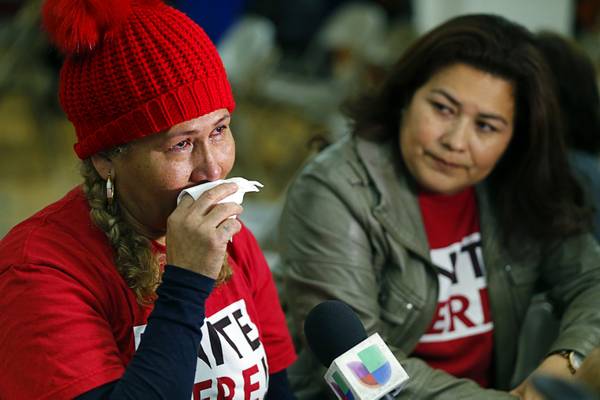Related news
Several thousand Nevada residents from El Salvador will likely become deportable in September 2019 and should seek legal aid in the coming months, an expert says.
The Trump administration is ending temporary protected status for citizens of El Salvador, a designation that had been in place since earthquakes hit the country in 2001. The government said Monday that conditions that led to the designation no longer exist.
About 6,300 Nevada residents are TPS holders from El Salvador, Honduras and Haiti, according to the Center for American Progress. The group says 4,800 of those TPS recipients are Salvadoran and are parents to about 5,200 U.S. citizens.
Victor Mora, a Bellagio utility porter who spoke through a Culinary Union translator Monday, said he left El Salvador in the ’90s to escape the country’s civil war. He moved to Las Vegas from Los Angeles shortly after receiving a work permit. He said if he has to leave the U.S., his three U.S.-born children would stay behind.
“What worries me the most is that without papers I wouldn’t be able to work,” Mora said. “Without papers I would go back into the shadows.”
Michael Kagan, director of the immigration clinic at UNLV, said citizens of El Salvador living in the U.S. should seek legal help. His office is working to coordinate an event next week for free legal screenings in response to Monday’s announcement. The local Culinary Union is also working with the immigration clinic as well as the Legal Aid Center of Southern Nevada to coordinate events in the community and inform immigrants.
Kagan said there is a laundry list of possible immigration statuses for people to pursue, but that it’s likely that most people who are on TPS now will become deportable. He said a recent court decision has made it somewhat easier for people who have TPS to apply for other immigration statuses if they’re eligible.
“They still have to be eligible for some other visa and it’s probably likely that most people won’t be, but some significant number will,” he said. “It’s really important for people to get legal consultations.”
Kagan said people should pursue legal advice from qualified lawyers find help at such organizations as the Legal Aid Center, which also offers free classes and resources.
Ending TPS for El Salvador will likely be a huge shock to families, which are often made up of a mix of immigration statuses, as well as El Salvador itself, where the return of roughly 200,000 people in the coming months could have a destabilizing effect, Kagan said.
El Salvador is smaller than the population of New York City, and adding 200,000 residents to the 6.2 million people living there will be shocking to both the country’s infrastructure and economy, Kagan said. In extending the country’s TPS designation in 2016, the federal government noted consequences of the earthquakes as well as economic and safety concerns due to gangs in the country.
Mora, who has paid roughly $25,000 into Social Security in his years working at the Bellagio, says he fears what gangs will do to those who return. Two of a friend’s siblings were killed in El Salvador for refusing to join a gang, Mora said, and he worries that organized criminals will target those returning from the U.S. for extortion.
“The ones that don’t give money, they just kill those people,” Mora said through a translator. He said he wants Congress and his employer, MGM Resorts International, to support residency for immigrants like him.
Geoconda Arguello-Kline, secretary-treasurer for the Culinary Union, said the group will continue its efforts to protect workers and encourage lawmakers to support two pieces of legislation in Congress. The bills would allow certain TPS holders to obtain permanent residency, a step on the path to citizenship. She said the union has been working to communicate the latest news to its members and let them know what next steps they can take. The group is encouraging residents to know their rights and seek legal advice.
El Salvador is the biggest of all the TPS groups, and Las Vegas has one of the largest Salvadoran populations in the country, Kagan said.
“You’ve got a really large group of people from a country that’s extremely unstable and violent, people who have lived here for a very long time and a very large concentration of them here in Las vegas in particular who are going to go from being legally in the U.S. to being undocumented in September 2019,” he said.
Monday’s decision comes after the Trump administration ended TPS for Haiti, Nicaragua and Sudan. The government is also ending a temporary program that, since its implementation under the Obama administration, has given two-year protection from deportation to about 800,000 young immigrants.
“It’s not a surprise that this is what the Trump administration wanted to do,” Kagan said of ending TPS for El Salvador. “They’ve been obviously hostile to immigrants generally and especially the Central American immigrants, and maybe it’s especially the Salvadorans because of the stigma of gang affiliations that the Trump administration has been promoting.”

